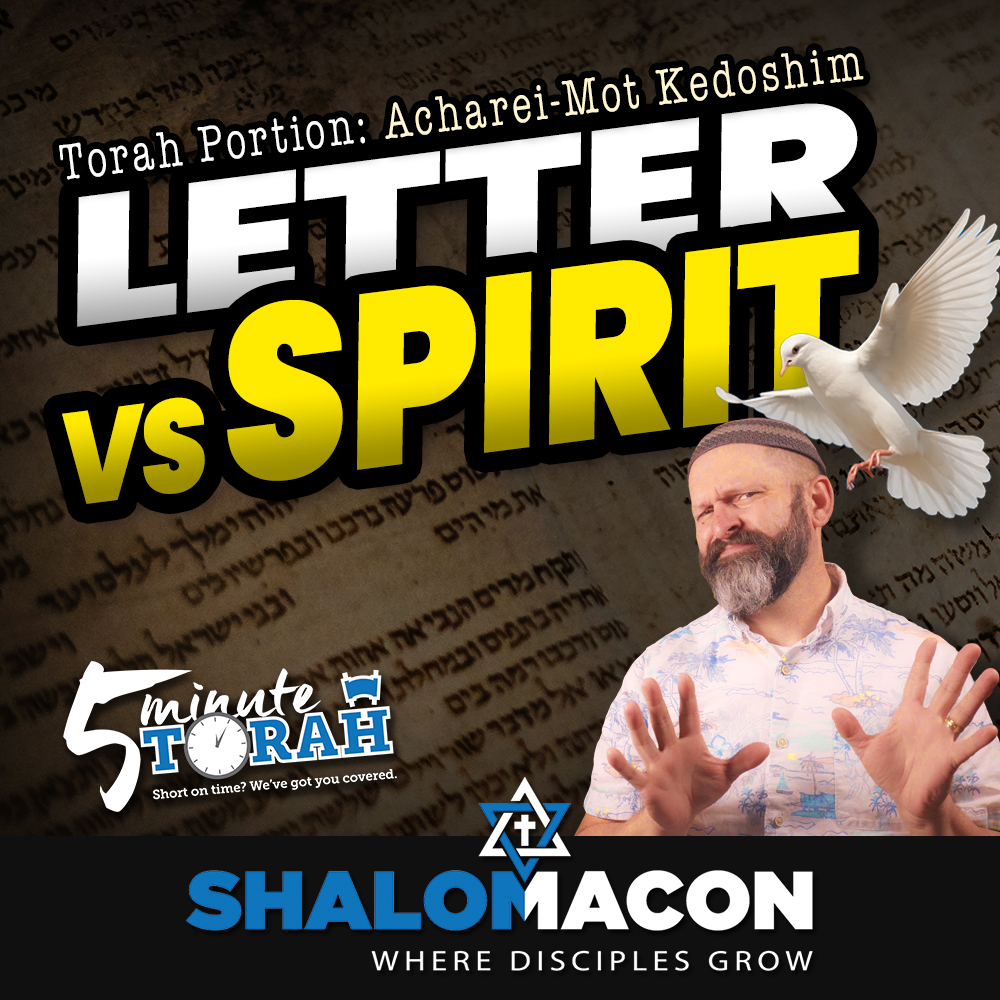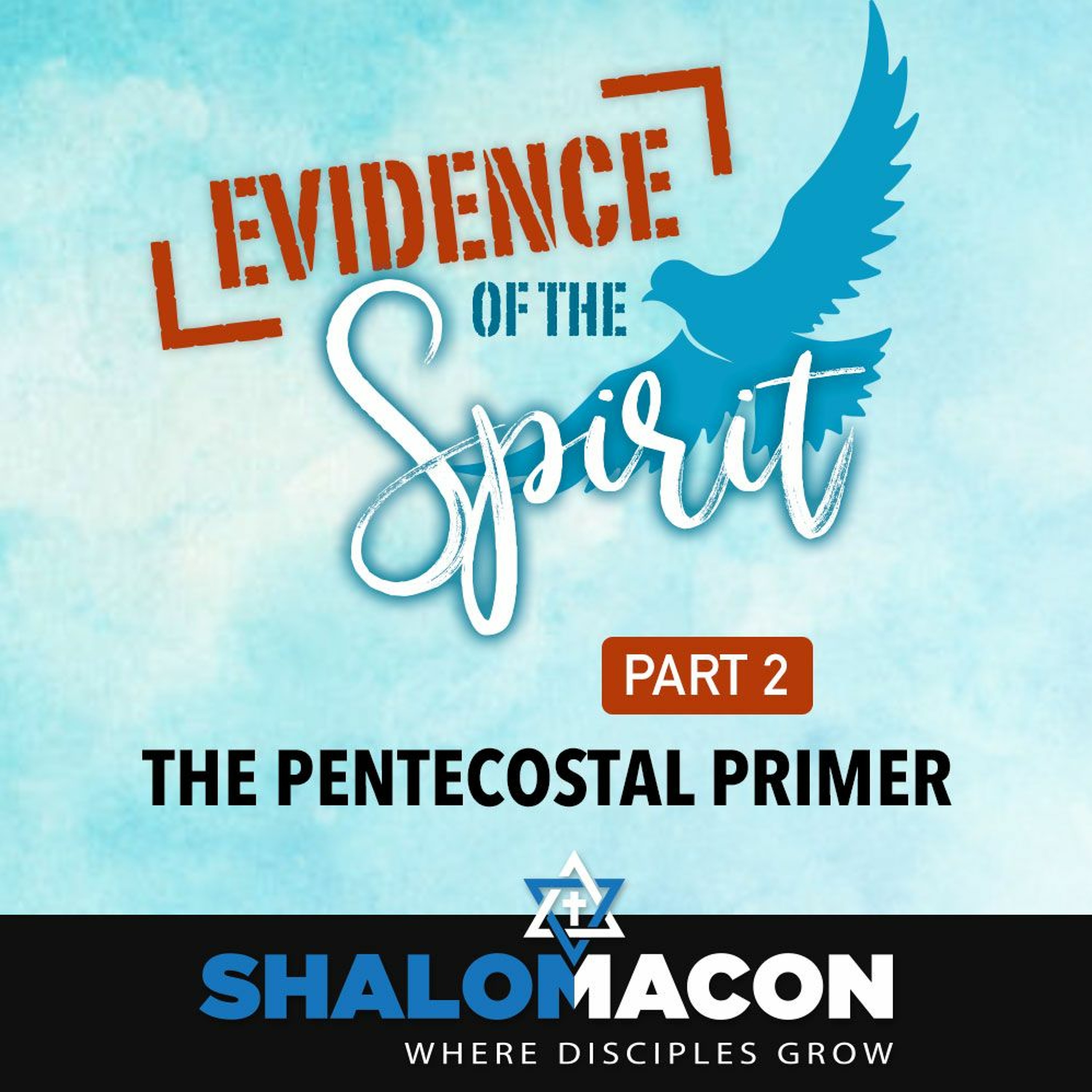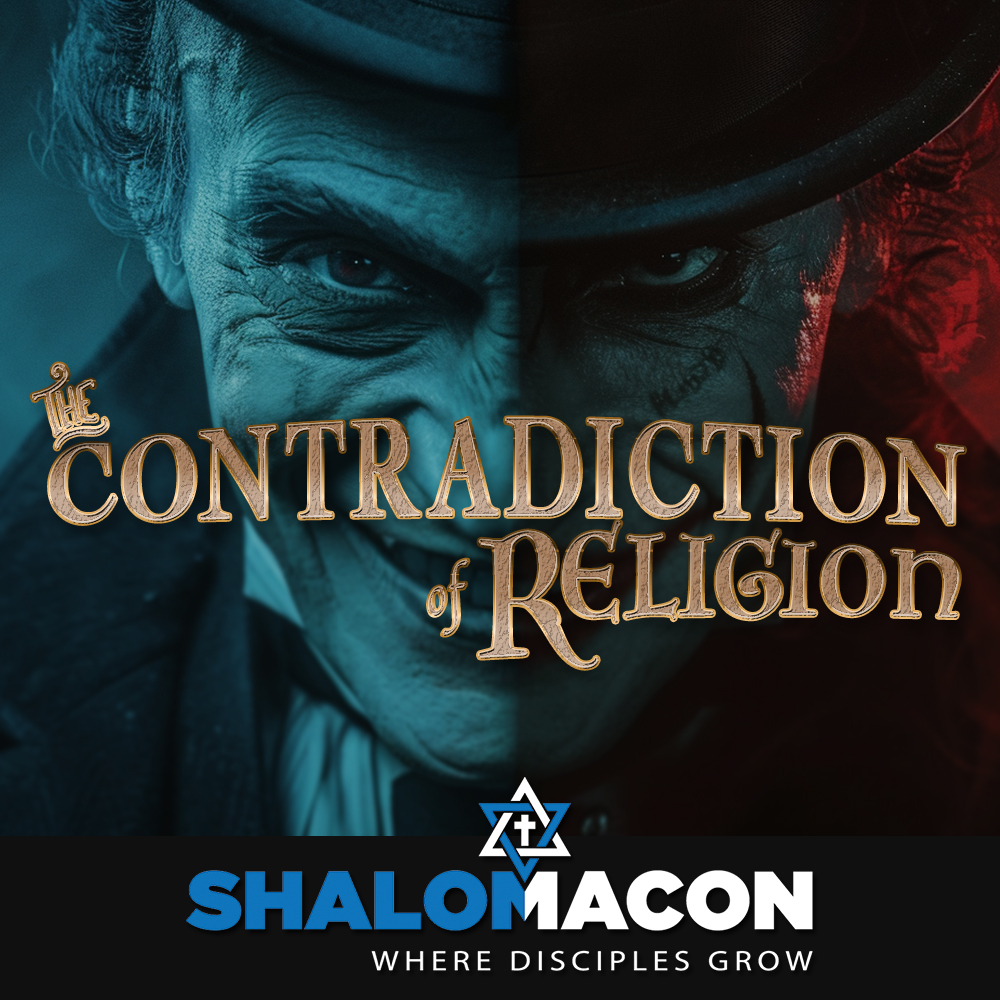Episode Transcript
[00:00:00] I live by the spirit of the Law, not the letter of the Law. You've probably heard people say something like that before. You may have even said it yourself. Paul refers to followers of Yeshua as ministers of a new covenant, not of the letter, but of the Spirit. For the letter kills, but the spirit gives life. 2 Corinthians 3:16. You keep quoting that scripture, but I do not think it means what you think it means. But does the letter of the law mean the Torah, while the spirit of the law means the spiritualization of the law? Does the spirit of the Law conflict with the letter of the law? Is one right and the other wrong? Well, if you'd like to have a better understanding of this misrepresented topic, then stick around for this week's 5 Minute Torah Shalom and blessings from Shalom Macon, the place where disciples of Yeshua learn, connect and grow. I'm Darren, and before I get into the five minutes of my five Minute Torah commentary, let's cover a few quick facts about this week's Torah portion. This week we are in the 29th and 30th Torah portions. We are studying the double portion of Acheremot and Kedushim Leviticus 16:1 through 2027, and here are the three things that you need to know about it. Number one Yom Kippur Avodah Day of Atonement Service the Yom Kippur service described in our current Torah portion is a solemn ritual performed by the High Priest to atone the sins of himself, his household, and Israel as a whole. This service takes place in the Holy of Holies, the innermost chamber of the tabernacle or temple, which the High Priest enters only on this day. He first offers a bull as a sin offering for himself and his family to purify and sanctify them. Then two goats are presented, one is sacrificed to God and the other, known as the scapegoat, is sent into the wilderness. To quote Azazel, before releasing the scapegoat, the High Priest lays his hands on its head and confesses over it all the iniquities and transgressions of the children of Israel, symbolically transferring their sins to the goat. He also sprinkles the blood of the sacrificed bull and goat inside the holy of Holies and on the altar to cleanse it from human impurities and sanctify it from the transgressions of the people.
[00:02:15] A Call to Holiness More than a Badge the theme of holiness permeates this week's Torah portion, setting the stage for how God's people are to conduct themselves in all contexts. This commandment to be holy, as expressed in the opening verse of the portion of Ketoshim, you shall be holy for I, the Lord your God am holy serves as the foundational call that influences all subsequent laws and ethical instructions detailed in these portions. Holiness is depicted not only through adherence to specific religious rituals and observances and but also through everyday actions and interactions with others. The laws laid out for us in Ketoshim span various aspects of life, including ethical behavior, justice, respect for family and elders, and laws of sexual morality in addition to the ones we learned last week. Each of these reflects the sanctity God expects in both communal and personal life by intertwining daily conduct with high moral and spiritual standards. The portions of Achoraimot and Kerushim challenge Israel to reflect God's holiness in in every aspect of life and Number three Priority of Love who is my Neighbor? In our current Torah portion, the commandment to love your neighbor as yourself is a pivotal commandment that supports the entire framework of social and religious laws. This instruction, found in Leviticus 19:18, is central to Jewish ethical teachings and serves as a cornerstone for how any commandment of Torah is observed. It calls for empathy, respect, and a commitment to treat others with the same care and consideration one would desire for oneself. We see this principle echoed in the teachings of Yeshua, who emphasized this verse as the very essence of everything the Torah and the prophets teach us. In the Apostolic Scriptures, Yeshua cites this commandment to love your neighbor as yourself and esteem it as one of the two greatest commandments. It is second only to loving God with all one's being. This commandment rises above religious differences and captures a universal truth about how we should live, helping us build a kinder and more compassionate world. Are you a disciple of Yeshua? There are a lot of people who say they are, but when it comes down to it, they really don't even know what it means to be a disciple. Why? Because discipleship is a concept unique to Judaism. It's an intimate relationship between a rabbi and his student. Yeshua called 12 men to be in his inner circle of discipleship, and those 12 men changed the world. What did they know about being a disciple that we don't? I wrestled with this question when I wrote my book the Four Responsibilities of a Disciple. There were a ton of books already written on how to make disciples, but I wanted to know what it meant to be a disciple because it seems that all of these disciples that were being made in our day really weren't having an impact on the world around them like they should. I found out that there were four responsibilities every disciple should know and that when implemented, living out these four responsibilities has the potential to change the world. If you want to know what it means to be a true disciple of our Master Yeshua, then check out my book, the Four Responsibilities of a Disciple, using the link below. This week's Torah commentary is called the Spirit of the Law and comes from my book 5 Minute Torah, Volume 3. Parashat Ketashim is primarily focused on on practical, ethical laws that will set Israel apart from her surrounding nations. It begins with the directive, you shall be holy, for I, the Lord your God am holy. Leviticus 19:2 but when the Lord gives this instruction, he tells Moses to speak this quote to all the congregation of the people of Israel. The way the Lord addresses the children of Israel is unique to this event. Let's take a look at why this is the case. So far in the book of Leviticus, most of the instructions have been to Aaron and his sons and and then to the priesthood in general. In our previous portion, the Lord expands His instructions from the priesthood to the nation as a whole by saying, speak to Aaron and his sons and to all the people of Israel. This is chapter 17, verse 2.
[00:06:16] Now he specifies that these instructions are to be heard by all the congregation of the people of Israel. In other words, whereas the previous instructions to the children of Israel could be relayed to anyone not present during Moses teaching, the this time he wants every individual to be present, hence quote the congregation so that they can hear these important mitzvot. What's so important about these particular commandments? Hasn't the Torah given some very important ones already? Evidently the mitzvot contained in this section of the Torah have some critical bearing on both the nation and the individual. They include things like taking care of the poor, honest business dealings, impartiality in court, not bearing grudges, honoring parents and elders, and not giving in to temptations to look and act like the people around them. This is a short list of things intended to make Israel stand out as a holy nation consecrated to the Lord. But there's a problem in trying to establish parameters of holiness. In his long commentary on this verse, Nachmanides makes the famous statement that it is possible to be disgusting with the permission of the Torah. What does he mean by this? He's saying that one may follow the most literal instructions of the Torah and still be a despicable human being. How is this possible? Because the Torah can only give general boundaries for things such as integrity, fairness, kindness, respect and wholesome speech. It doesn't have the ability to legislate character. This is why the Mishnah and the Talibud work to define what it means to be respectful, honest, equitable, etc. Still, though some people always find a legal loophole to be a foul human being, we can see this today even among the followers of Yeshua. Although the apostolic scriptures are heavy on ethical teachings and emphasize the importance of proper character, some people still claim to be disciples of Yeshua but find ways to skirt around these restrictions. This is why Paul says the letter kills, but the Spirit gives life.
[00:08:18] He prefaces this statement by saying that as disciples of Yeshua, we are ministers of a new covenant, not of the letter, but of the Spirit. Paul makes this statement as an allusion to the New Covenant passage in Jeremiah. The Lord used the prophet Jeremiah to tell us what it will be like when the New Covenant is fully in effect. For this is the covenant that I will make with the house of Israel after those days, declares the Lord, and I will put my law within them, and I will write it on their hearts, and I will be their God, and they shall be my people. And no longer shall each one teach his neighbor and each his brother, saying, know the Lord, for they shall all know me, from the least of them to the greatest, declares the Lord. Jeremiah 31, 33, 34. Although Yeshua inaugurated the New Covenant, we are still waiting for its fullness. Paul wanted to communicate to his readers that that they should be evidence of this reality. The evidence of the New Covenant is a renewed heart that bends its will to the divine will. Being within the technical boundaries of the Torah, God's will on earth does not necessarily mean one's heart is in the right place. It just means that I'm doing what is expected of me. No more. And although there is merit in adhering to the strict letter the halakhic boundaries of the Torah, the there's much more. When we go above what the Torah requires, we have to live our lives according to the Spirit of the Law. What does this mean? It means approaching the Torah as Yeshua taught us. The letter of the law says, don't commit adultery. The Spirit of the law says, don't have wandering eyes and lustful thoughts. The letter of the Law says, don't murder. The Spirit of the law says, don't nurse anger. The letter of the law says that when someone does wrong against you or your property, you have the right to file civil action. Against them for damages. The Spirit of the law says, forgive them and leave it up to them to make things right. Disciples of Yeshua are called to live this standard of holiness, just as Peter quoting our Torah portion tells us, as he who has called you is holy, you also be holy in all your conduct, since it is written you shall be holy, for I am holy. 1 Peter chapter 1, verse 15 and 16 Living by the letter of the Torah is the minimum, but disciples of Yeshua should go beyond the letter and live by the Spirit of the Torah, infusing this world with godliness so that the world may see our good deeds and glorify our Father in Heaven. If you want to understand how Rabbinic literature helps us better understand the teachings of Yeshua, then I've got the perfect series for you. A few years ago, I published a series of videos on a Rabbinic text called Perkei Avot, also known as Ethics of the Fathers. My series is called Per Kevot and the Teachings of Yeshua. You should check it out. It will revolutionize the way you look at both Rabbinic literature and the teachings of our Master. Just click on the link right here to get.



